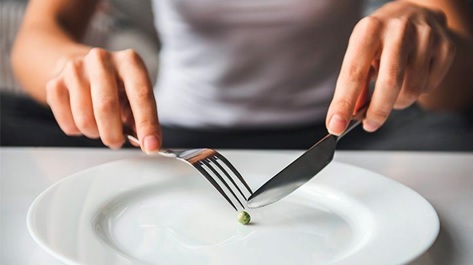
Do you feel like the Very Hungry Caterpillar? No matter how much you eat, you never feel full and satisfied. There are a few explanations as to why this might be the case. Maybe it’s your protein intake, hydration levels, choosing the wrong foods or lack of sleep. Either way it is a problematic issue that can decrease your quality of life. No one likes to be around someone who is constantly hangry. If you find you’re often irritable and dealing with an insatiable appetite then read below. You’ll find out about the different explanations for unexplained hunger and whether any of these apply to you.
You Drink Your Calories
When solid food touches the walls of our tummies, our body sends us a signal that we are full and don’t need to continue eating. This is because our stomachs have sensors that can detect how much food is inside. These are known as tension-sensitive gastric mechanoreceptors. If these receptors do not detect enough food, we will still feel hungry. Fizzy drinks, juices and milkshakes are quite calorie dense but don’t have very much volume. This means we can’t rely on just liquid calories if we want to feel satisfied. We need to experience the sensation of physical fullness. Increasing the volume of food you’re eating will help you get to that level of satisfaction. High fibre foods like broccoli, rice and potatoes are great options to include. If you’re having a smoothie for breakfast but still feeling ravenous afterwards, try eating something solid that will actually touch the sides. High volume foods are the key to feeling satiated.

You Need More Sleep
Sleep and appetite are inextricably linked. I’m sure you’ve previously experienced ramped up hunger after a poor night of sleep. The reason for this is hormonal. When we fail to get sufficient sleep, our hunger hormones fall out of balance. Production of ghrelin (the hormone that makes us hungry) increases, which leads to an insatiable appetite. Additionally, we don’t tend to make the best food choices when we are irritable and fatigued. If you experience disrupted sleep regularly, you can expect some very negative health issues to pop up later down the track. Research shows that those who get less than seven hours of sleep per night don’t feel as satisfied after meals compared to those who get enough rest. Interestingly, studies have found that sleep deprivation increases endocannabinoid levels. This means that lack of sleep can have the same effect on our appetites as smoking marijuana. Going to bed too late can actually give you the munchies. If you are always ravenous, ask yourself “is this true hunger or am I not sleeping enough?”. You might be surprised to know that it’s not you, it’s your sleep hygiene.

You’re Dehydrated
Dehydration and hunger can feel the same if we aren’t totally in tune with our body signals. Failing to get enough water throughout the day can leave us feeling depleted. It’s easy to mistake this feeling for hunger. This is because the part of our brain (the hypothalamus) that regulates thirst also regulates appetite. If you can’t quite tell whether the sensation you’re experiencing is hunger or thirst, try downing a big glass of water. You could literally drown out the hunger signals and give your body what it truly wants. Experts recommend not waiting until you’re thirsty to drink. It’s good to get into the habit of regularly sipping on water throughout the day. Obviously you don’t need to overhydrate to the point where you’re constantly in and out of the bathroom. But keep your water bottle nearby and take regular swigs. This way you’ll know for sure when you’re experiencing true hunger as opposed to dehydration.

You’re Not Getting Sufficient Protein
Protein is one of the three macronutrients your body needs (carbohydrates and fats are the other two). It is a myth that only gym goers and bodybuilders need to be concerned with their intake. Even those who live sedentary lifestyles should care about how much protein they get. A plethora of research tells us that low protein diets are a one way street to feeling famished. Study participants who are given higher protein meals eat less total calories compared to those given lower protein options. The high protein groups in the research always report feeling satiated after eating while the low protein groups complain they are still starving. Eating protein stimulates the production of hormones that make us feel full (like peptide YY). If you are eating a meal that consists mostly of carby options like bread, then it’s likely you’ll still be peckish after. Most people agree that a protein shake would be more filling than a can of coke. For those who never experience satiety after a meal, take a look at your protein intake. It is likely you aren’t getting enough to stimulate those appetite suppressing hormones. Try eating a dish with lots of fish, eggs, chicken, cottage cheese or steak and see how you feel. Chances are that your appetite will completely disappear.

You’re Not Eating Enough Calories
Maybe the reason you’re always hungry is because your body actually needs energy. Energy for the body is often measured in units called calories. If you don’t eat enough calories to fuel the activities you do everyday, you will feel fatigued, depleted and your tummy will rumble. This is your body’s way of saying it needs more fuel. You might think eating a small salad is a healthy choice but if it doesn’t provide the nutrients your body requires, your hunger pangs won’t disappear anytime soon. Under-consuming calories is equally as detrimental as over-consuming. This was exemplified by the famous Minnesota Starvation Experiment. In this study, 36 men were put on low calorie starvation diets. The negative effects experienced by the subjects were both physical and mental. They all lost strength, stamina, became depressed, gaunt and obsessed with food. One subject even cut off his own fingers likely because the psychological effects of starvation were too overwhelming to handle. Basically, the human body doesn’t like to starve. If you complain that you’re always hungry, it might be because you actually are. Ensure this doesn’t happen by eating regular nutritious meals that are large enough to give your body the fuel it needs.

Conclusion
If none of these factors apply to you, then perhaps you are dealing with boredom or emotional hunger rather than physical. Usually we feel ravenous because we aren’t getting enough of something. That something could be fibre, sleep, calories or protein. Have a think about what your life is lacking and then make a plan to fill that gap. You can’t live a full life on an empty stomach.
